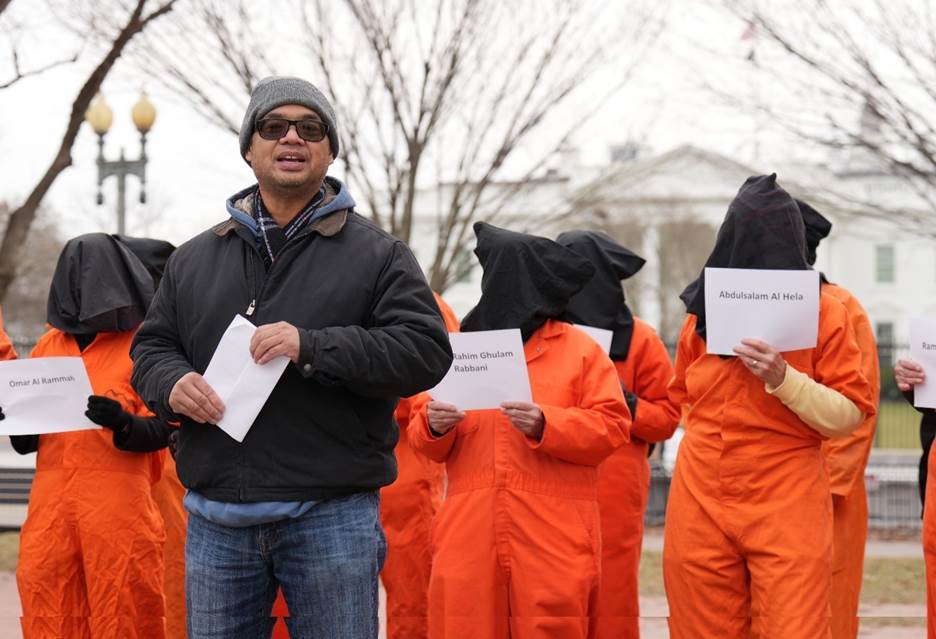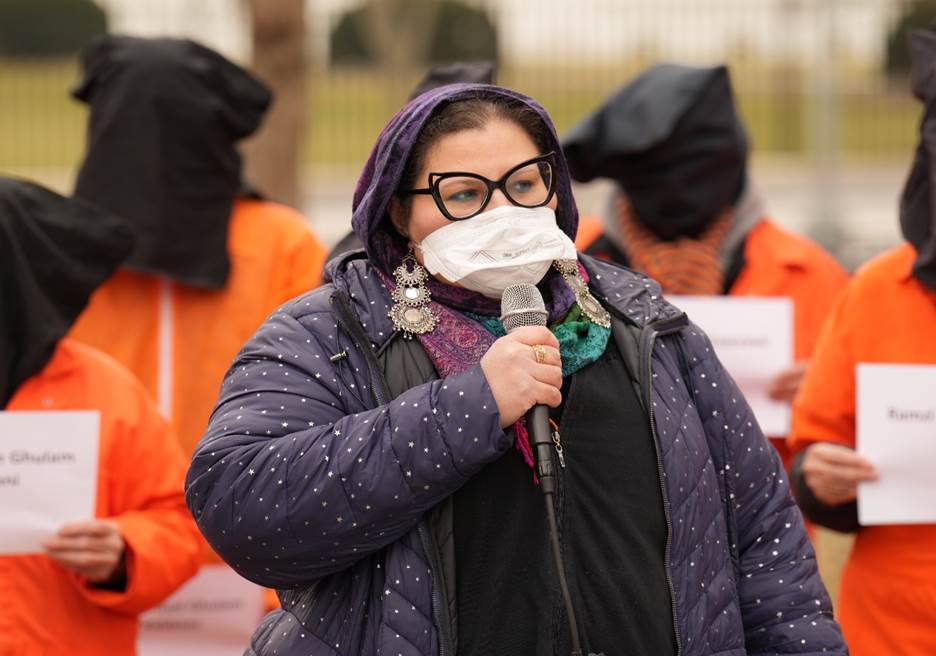

Human Rights Defenders Call for Closure of Guantanamo
By Elaine Pasquini
Photos by Phil Pasquini

Washington: Twenty-one years after the opening of the US detention center at Guantanamo Bay, activists are still calling for its closure. On January 11, as they do every year, human rights defenders gathered in Lafayette Square across from the White House to demand that President Joe Biden uphold his campaign promise to close the prison and torture site. Activists wore orange prisoner jumpsuits and black hoods while holding signs displaying a prisoner’s name.
Since the US government opened the Guantanamo Bay Detention Center on January 11, 2002, 779 Muslim men and boys have been incarcerated there, said Herb Geraghty of Witness Against Torture. “Since then, nine of them have died.”
Maha Hilal, co-director of the Justice for Muslims Collective, a group dedicated to closing the US prison in Guantanamo, noted after 21years and four administrations “we still have the problem of Guantanamo.”
The humanitarian group calls for not just the closing and abolishment of the prison, but for the United States to acknowledge the “wrongdoing of Guantanamo,” she said. “Although it is hard to have any semblance of hope, we must recognize and think of 2023 as the year when Guantanamo will finally be closed.”
James Yee, a West Point graduate and former US Army Muslin chaplain at the Guantanamo Detention Center in 2002 and 2003, pointed out that Amnesty International has called Guantanamo the “Gulag of our time.”
In addition, he said, the International Committee of the Red Cross has described the treatment of prisoners at Guantanamo as “tantamount to torture.” Major newspaper editorials refer to Guantanamo as a “legal black hole and leaders of every corner of the globe have denounced Guantanamo,” he continued. “We are here today to try and bring justice to those who have survived Guantanamo and to those prisoners who remain in Guantanamo, but I am here also today to remember the nine prisoners who died at Guantanamo, seven reportedly by suicide.” All were being held indefinitely without charge.
Because of his personal objections to the abuse and torture of the prisoners held in Guantanamo, Yee was arrested and held in solitary confinement for 76 days while being falsely accused of aiding the “terrorist enemy.” After an extensive investigation, all charges against him were dropped.
Presently, 35 men – the majority of whom have never been charged with a crime – remain incarcerated within the 45-square-mile US Naval base on which the high-security prison is located.
Twenty detainees have been cleared for release by high-level government review processes. But without given a definitive release date, those cleared could remain incarcerated indefinitely. One obstacle to release is finding a country – either a detainee’s home country or a third one – with the required security guarantees necessary to establish a new life for a discharged prisoner.
Two prisoners cleared for release are Pakistani citizens Mohammad Ahmed Rabbani and his brother, Abdul Rahim Ghulam Rabbani, seized in 2002 and held in CIA black sites until they were transferred to Guantanamo in September 2004. The brothers are expected to be repatriated to Pakistan this month.
In October, Saifullah Paracha – the oldest prisoner held in Guantanamo – was released and reunited with his family in Karachi. The 75-year-old had been incarcerated in the prison for 18 years but never charged with a crime.
Since the prison’s inception, approximately 540 prisoners were released during the George W. Bush administration, 200 during the Barack Obama administration and President Donald J. Trump only released one prisoner. In addition, one detainee was sent to the United States for trial and is now serving a life sentence in a federal prison in Kentucky.
Afghan citizens were most represented among the detainees over time. Many had been handed over to the United States by Afghan and Pakistani security forces early in the US invasion of Afghanistan.
According to the Geneva Conventions of 1949, “Prisoners of war shall be released and repatriated without delay after the cessation of active hostilities.”
Beyond the human tragedy and moral costs of operating the prison, American taxpayers are paying a high price to keep the facility open. According to Human Rights Watch, the US spends more than $540 million per year to detain the 35 prisoners.
In closing, Iman Saffet A. Catovic, head of the office of interfaith and community alliances at the Islamic Society of North America, noted humankind is “…made in the image of God and are the children of God and as such are entitled to dignity and respect.” He further called for justice to be done in the United States and throughout the world. “This stain on the conscience of humanity, this act of horror and criminality [must] come to an end with the closing of Guantanamo.”
(Elaine Pasquini is a freelance journalist. Her reports appear in the Washington Report on Middle East Affairs and Nuze.Ink.)

